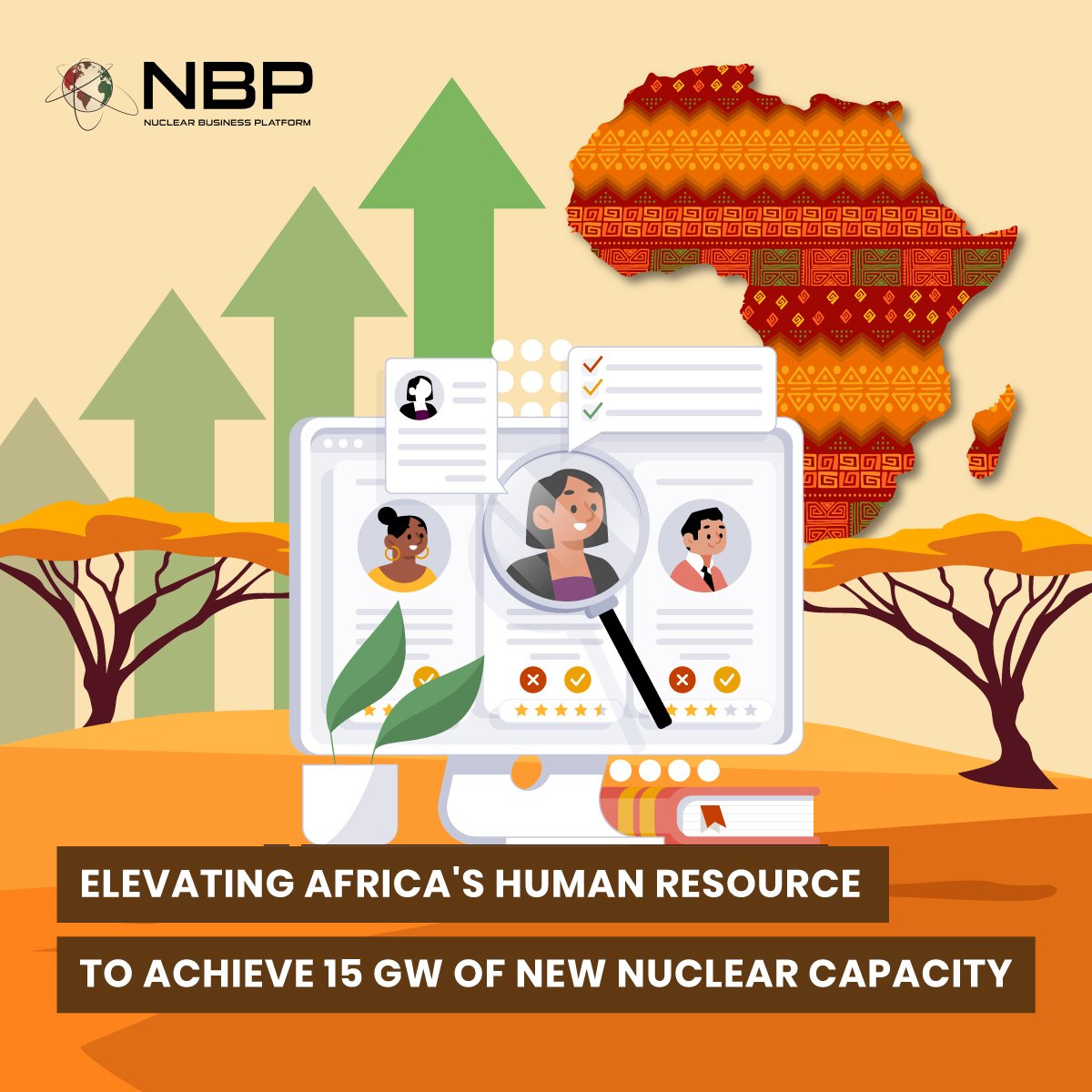Elevating Africa's Human Resource to Achieve 15 GW of New Nuclear Capacity
Human Resource Development (HRD) is crucial in the nuclear sector, with up to 80% of significant incidents at nuclear power plants attributed to human error, as noted by the International Atomic Energy Agency (IAEA). Highlighted as a pivotal element among the IAEA's national infrastructure priorities, HRD ensures personnel proficiency, adaptation to evolving technologies, and prioritization of safety.
Importance of HRD in the African Nuclear Sector
In Africa, the Nuclear Business Platform (NBP) anticipates a significant increase in nuclear energy adoption. By 2035, the continent is projected to have 15,000 MW of operational nuclear capacity. Leading this expansion are countries like Ghana, Uganda, Kenya, and Rwanda, planning reactors with 1,000 MW capacities each. Nigeria and Egypt aim for 4,800 MW each, while South Africa targets an additional 2,500 MW.
Therefore, HRD is essential in Africa's nuclear sector due to the industry's complexity and constant evolution. Ongoing training ensures staff proficiency and adaptation to new technologies and regulations. Without skilled workforce and HR support, nations face hurdles in nuclear development, particularly in safety culture establishment. HRD fosters safety-focused practices like incident reporting and open communication, crucial for success. African countries must prioritize workforce development to achieve their nuclear goals.
Collaborative Efforts in African Nuclear Development
Countries like Ghana, Kenya, Nigeria, and South Africa are collaborating with local and international universities to develop a skilled workforce in nuclear science. Initiatives include sending students abroad for training in leading nuclear technology nations like the USA, South Korea, China and Russia, to establish indigenous nuclear science curriculums. This fosters domestic expertise and ensures long-term sustainability. For instance, Prof. Elijah Mwangi, Director of the Institute of Nuclear Science and Technology and Professor of Electrical Engineering at the University of Nairobi, highlights that key stakeholders in Kenya's nuclear sector have received training from indigenous institutions, demonstrating the capability of African institutions in nurturing talent for the nuclear industry.
Leveraging from the Domestic Expertise for HRD
African nations are leveraging domestic expertise in nuclear HRD by seeking support from established nuclear countries on the continent, such as South Africa and Egypt. South Africa, with the Koeberg Nuclear Power Plant, leads in nuclear science and technology in Africa. It facilitates training and knowledge exchange through initiatives like African Regional Cooperative Agreement (AFRA). Egypt, constructing its first nuclear power plant, offers valuable expertise.
Ghana is advancing in nuclear HRD with support from the US Department of State to become a Small Modular Reactor (SMR) Regional Hub. A $1.75 million commitment will enhance nuclear workforce development through academic exchanges and partnerships. Additionally, international cooperation initiatives like WECAN (Winning an Edge through Cooperation in Advanced Nuclear), with the US and Japan position Ghana as a hub for advanced reactor technologies.
Harnessing Nuclear Research Reactors for HRD
Nuclear research reactors in Algeria, Egypt, Ghana, Morocco, and Nigeria serve as crucial hubs for human resource development in Africa. They foster collaboration among universities, research institutions, and the nuclear industry, providing hands-on learning opportunities for students. International partnerships enrich students' experiences and expose them to diverse perspectives.
Highlighting the importance of fostering nuclear training and education within Africa, utilizing the resources of nuclear research reactors, universities, and centers of excellence on the continent, not only enhances collaboration among African nations but also reduces the likelihood of African professionals who receive education and training overseas, particularly in regions like North America, Europe, and Asia, to stay there and lead to a brain drain. Therefore, Nuclear power plant simulators to be built in African countries offer cost-effective training solutions for normal and emergency operations which would benefit the host country as it will be an HRD hub and also the neighboring countries. Companies like L3Harris who provide simulators in Africa and which allow the training of future operators will definitely benefit the host African countries as they will benefit from the training but also train in the future other Africans with the simulator they acquired. L3Harris will serve as the Next-Gen Human Resource Development partner for the upcoming Africa Nuclear Business Platform 2024 (AFNBP2024) in Ghana, fostering collaboration and knowledge exchange in nuclear technology and HRD.
IAEA's Role in HRD and Technical Cooperation in Africa
IAEA supports technical cooperation in Africa with 456 active projects across 45 countries, including initiatives under AFRA. Its aim is to enhance human resource development, infrastructure, and technical cooperation. Long-term training programs cultivate experts in the field of nuclear energy. African Network for Education in Nuclear Science and Technology (AFRA-NEST) standardizes nuclear science curricula, and Morocco's National Center for Nuclear Energy, Science, and Technology (CNESTEN) is designated as the first IAEA African Centre of Excellence. IAEA provides fellowships to support talent development in nuclear science and technology across Africa.
Prioritizing Partnerships with Nuclear Mature Countries
Africa should prioritize partnerships with nuclear mature countries like the USA, Russia, China, Canada, France, and South Korea, beyond its commitment to the IAEA. These partnerships offer opportunities for investing in education and skill development programs, as well as establishing nuclear research reactors and power plant simulators. Africa's youthful demographic presents a dynamic workforce, ideal for innovation and productivity gains. Collaborations with local institutions and governments can tailor training initiatives to address nuclear industry needs, contributing to sustainable development across the continent.



